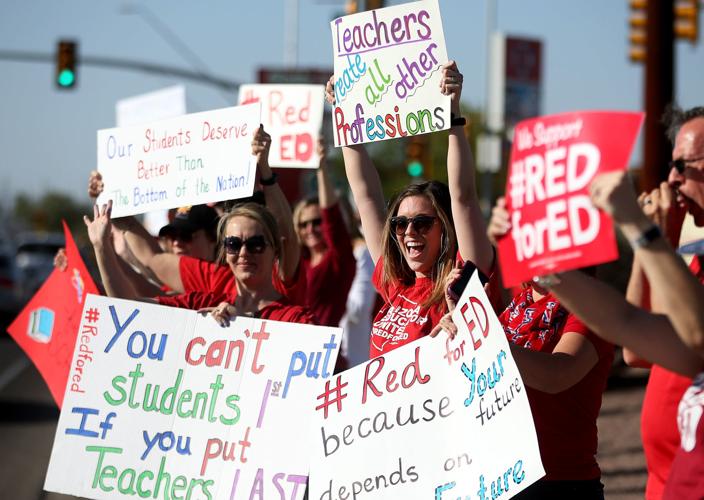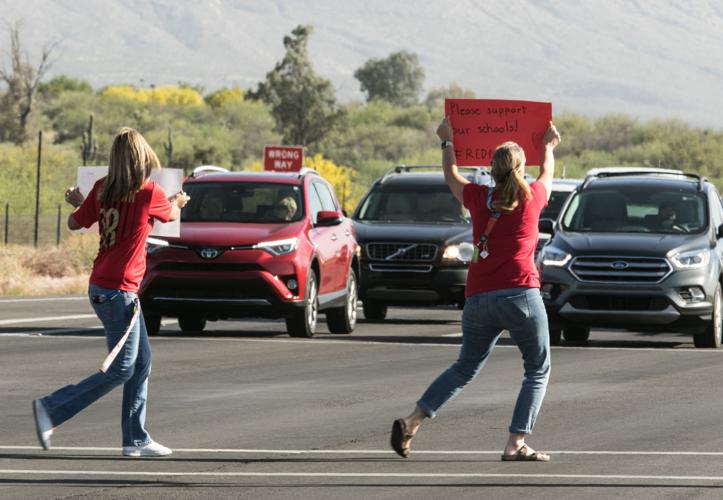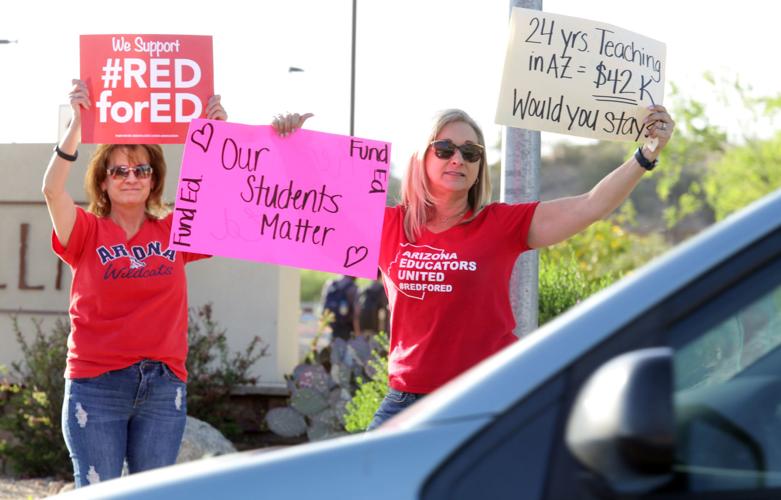Empowered by successful walkouts in other states, Arizona teachers began voting Tuesday on whether to follow suit here.
But if they do decide to walk — a decision is promised by Friday — it appears they will be acting illegally. And while there won’t be criminal charges, they run the risk of simply being replaced as having abandoned their jobs — and possibly having their certificates to teach revoked.
That, however, will depend on whether their school boards decide to follow through.
In the city’s largest school district, Tucson Unified School District, Superintendent Gabriel Trujillo told reporters Tuesday that teachers shouldn’t fear they’ll lose their jobs if they strike.
“This is not a confrontation,” Trujillo said. “The #RedForEd movement and our teachers have been wonderful. They’ve exhibited great leadership in this movement, and certainly we don’t view any of their actions as anti-Tucson Unified School District.”
TUSD is in the process of developing a district-wide contingency plan in case of a strike that would keep schools technically open with a skeleton crew providing basic transportation and food services for students and families who need it, Trujillo said. The district doesn’t have enough substitute teachers to call on to keep classes open, presuming subs would answer that call anyway, but other administrators and principals would still be working, he noted.
“Schools physically would be open, but instructional services would be closed — there would be no classes,” Trujillo said.
Still, Trujillo said he’s disappointed it has come to this, and while he was cautious not to point any fingers at teachers or Arizona Educators United, he said he hopes negotiations can be settled without resorting to a strike.
“I’m supportive of walk-ins. I’m supportive of #RedForEd. I’m supportive of gatherings before and after the work day. I can’t be supportive of an action that takes teachers away from students, particularly at a crucial point of the year when our kids need them most,” he said.
The voting comes as Gov. Doug Ducey is trying to convince teachers and others that there really will be enough money in the state budget to pay for his promised series of raises that, if approved, would boost average teacher pay by 19 percent over current levels by the 2020-2021 school year.
Organizers of Arizona Educators United, operating under the #RedForEd banner, have recommended that teachers and support staff vote to strike.
They cite what they say are shortcomings in the governor’s plan, including failure to include support staff in the pay raise plan and failure to restore per-student funding to where it was before the recession.
Trujillo said there’s still a lot missing from Ducey’s “one-dimensional” solution to Arizona’s education-funding problems, which include shortages for support-staff pay, and technological, building-repair, maintenance and transportation needs. But he said the governor’s promise to increase funding for teacher salaries by 19 percent over three years represents a “good initial step.”
“I will say one of our biggest needs is taking care of teacher salaries. It does seek to do that, which is why I say it’s a good initial step forward. But it still leaves a lot of questions to be answered,” he said of Ducey’s plan.
A big concern for skeptics is that Ducey contends he can find the money for the raises — $670 million above current funding — without increasing taxes and without a dedicated revenue source.
Joe Thomas, president of the Arizona Education Association, said teachers should not bank on any claim for raises beyond this coming year.
Ducey now is fighting back, at least on that last issue.
In a conference call Tuesday, aides to the governor rolled out projections of tax collections that by the 2020-2021 school year should give the state an extra $1 billion over what is forecast for the coming fiscal year. That is based at least in part on a big jump in current revenue collections.
Some of that will be needed just to sustain current spending levels as state population increases. But Matt Gress, who directs the governor’s budget office, said there will be enough additional dollars to finance the teacher pay raises when coupled with Ducey rearranging his other priorities.
One of those shifts, for example, is taking $8 million that the governor had originally earmarked in new funding for universities and instead putting it in to K-12 education.
But Ducey’s plan is based on the relatively recent conclusion that the dollars are rolling in faster than anticipated and will continue to do so as the economy improves.
Economist Dennis Hoffman of Arizona State University, a consultant to the governor’s office, said it turns out that employment last year was stronger than previously thought. That means it is not unreasonable to assume an annual growth rate in tax collections of 5 percent to 6 percent, he said.
Several teachers were invited to meet with Ducey on Tuesday.
“I believe that he’s committed to the plan,” Michelle Thompson, who teaches elementary school in Pima Unified School District, said afterward. “But trust is an issue.”
Thompson said she started the day thinking she would vote to strike. After meeting with the governor, she’s not as sure.
The lack of a guaranteed revenue source has been one key reason that organizers of the #RedForEd movement called for a vote of teachers and support staff to decide whether to strike even with Ducey’s offer on the table.
A key piece of the decision individual teachers are making has to do with the personal risk of going on strike as compared to the benefits of getting not only some guarantee of future raises but also the other things Arizona Educators United says are necessary, like restoring the $1 billion in cuts in classroom funding and including support staffers in the pay raises.
Strictly speaking, there is no specific Arizona law that precludes teachers from walking off the job. So there is no danger of being arrested — or of being found in contempt should the state or local districts try to seek a court order to force teachers back to work.
But it’s not that simple. In a 1971 opinion, then-Attorney General Gary Nelson said the lack of a legal prohibition does not make strikes legal.
“Under the common law, strikes by public employees are forbidden,” he wrote, saying that a strike by public employees is considered “an act against the public itself.”
As to the penalty, Nelson said Arizona law appears to say that a teacher who strikes after signing a contract has effectively resigned. He said state law makes it illegal to resign without first getting the approval of the local school board.
Moreover, Nelson said a teacher who resigns without that approval is guilty of unprofessional conduct. That, in turn, allows the state Board of Education to revoke the person’s teaching certificate, he said.
Joe Thomas, president of the Arizona Education Association, said he has nothing to contradict that. “That’s something we have communicated out to all our members so they understand the risk that if you’re not at school when you’re supposed to be at school, there can be repercussions,” he said.
“What everyone understands is the district could terminate you,” Thomas said. “And the district could go after your certificate.”
It was that threat that ended the last teacher strike in Arizona, in 1980 in Sierra Vista when slightly more than half of the district’s 300 teachers walked out. They were back in class a month later after teachers were told to accept the board’s last offer or be replaced. Their base salary remained unchanged.
Derek Harris, an organizer of Arizona Educators United, said teachers do have something going their way today. “We’ve worked on the assumption that they can’t fire all of us,” he said. “If it was that easy to replace everybody, we wouldn’t have 2,000 teacher jobs unfilled.”
At Tucson High Magnet School on Tuesday afternoon, teachers who were voting whether or not to strike didn’t seem too worried about being fired for walking out — they were more concerned about losing good teachers and employees if they don’t.
Aida Castillo-Flores, a 10th-grade biology teacher who has been with the district nearly 20 years, said Tucson High has a long history of being able to retain teachers. But now, many young teachers quit within a few years because they simply can’t afford to keep the job, she said. “I’m tired of not being able to keep those very good young people,” she said.
At Tucson High the “voting booth” was a small table in the staff parking lot. The “ballot box” was a shoebox covered in masking tape. As of 5 p.m. Tuesday, about 80 employees had voted, out of about 260 employees who are eligible to vote.
Out of about a dozen employees who voted while a Star reporter watched, only one woman, who declined to give her name, said she didn’t support a strike. Angela Merritt, an English teacher and Arizona Educators United organizer who was running the “booth,” encouraged her to vote anyway.
Many more felt they had been pushed to a breaking point.
“What we’re asking for is restoring 2008 funding — 2008. We should be talking about 2018 funding,” said Magdalena Cohen, an instructional specialist at the school.







